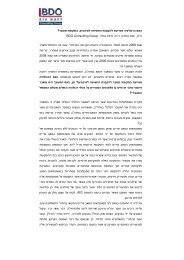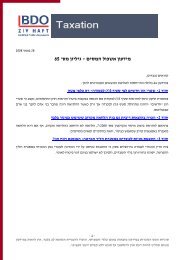preface
preface
preface
You also want an ePaper? Increase the reach of your titles
YUMPU automatically turns print PDFs into web optimized ePapers that Google loves.
12<br />
THE ISRAELI ECONOMY IN 2010<br />
1.2.6. Monetary Development and Capital Markets<br />
The Consumer Price Index (CPI) rose by 2.7% in 2010, compared with<br />
a 3.9% rise in 2009 and a 3.8% rise in 2008. In 2010, the government's<br />
annual inflation target of 1%-3% was accomplished. The main<br />
contributors to the CPI increase in 2010 were the prices of housing,<br />
transportation, communications, and fruit and vegetables.<br />
Although many of the advanced economies are growing slowly despite<br />
their expansionary fiscal and monetary policy, Israel achieved a high<br />
rate of growth in the economic and employment sectors during the<br />
second half of 2009 and in the first half of 2010.<br />
Israel, like most other countries, implemented a very expansionary<br />
monetary policy in late 2008 and early 2009, hoping to recover from the<br />
downside effects of the global economic crisis. Unlike many of the<br />
leading economies, the Israeli economy responded quickly to the<br />
expansionary policies. At the end of the second quarter of 2010, Israel<br />
achieved the pre-crisis levels of economic activity and employment. The<br />
major challenges for policymakers were determining the interest rate<br />
adjustment pace and deciding what other policy tools should be<br />
implemented, particularly regarding the foreign exchange market<br />
interventions and supervisions.<br />
Inflation forecasts for the upcoming twelve months indicate a<br />
continuing rise in the CPI within the target range. The major contributor<br />
to the anticipated CPI increase is the housing index. This index rose by<br />
6% between January and September 2010 and is expected to rise by 8%<br />
during the next 4 quarters. Conversely, other components of the index<br />
are expected to grow continuously at a lower rate of approximately 1%.<br />
Addressing the monetary policy, the Bank of Israel moderated the<br />
monetary expansion as of the third quarter, bearing in mind the<br />
increased inflation, expansion in economic activity and the rapid rise of<br />
housing prices. In December 2010, the Bank of Israel set the interest<br />
rate at 2%.<br />
BDO Israel

















